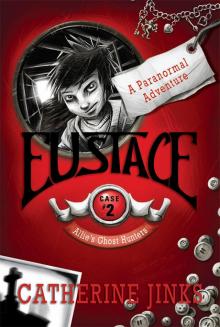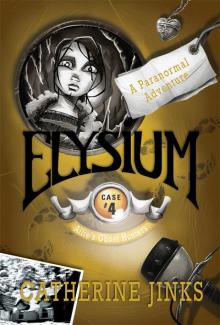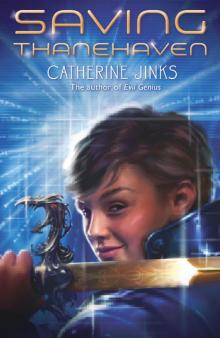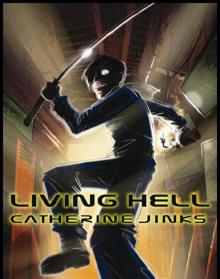- Home
- Catherine Jinks
The Genius Wars
The Genius Wars Read online
THE GENIUS WARS
BY THE SAME AUTHOR
The Reformed Vampire Support Group
Genius Squad
Evil Genius
Living Hell
This Way Out
The Future Trap
Witch Bank
Eye to Eye
Piggy in the Middle
What’s Hector McKerrow Doing These Days?
The Pagan Chronicles:
Pagan’s Crusade
Pagan in Exile
Pagan’s Vows
Pagan’s Scribe
Pagan’s Daughter
See also: www.catherinejinks.com
THE GENIUS WARS
CATHERINE JINKS
ACKNOWLEDGEMENTS
With thanks to Ken Wilson, Margaret Connolly and Peter Dockrill for their assistance
First published in 2009
Copyright © Catherine Jinks, 2009
All rights reserved. No part of this book may be reproduced or transmitted in any form or by any means, electronic or mechanical, including photocopying, recording or by any information storage and retrieval system, without prior permission in writing from the publisher. The Australian Copyright Act 1968 (the Act) allows a maximum of one chapter or 10 per cent of this book, whichever is the greater, to be photocopied by any educational institution for its educational purposes provided that the educational institution (or body that administers it) has given a remuneration notice to Copyright Agency Limited (CAL) under the Act.
Allen & Unwin
83 Alexander Street
Crows Nest NSW 2065
Australia
Phone: (61 2) 8425 0100
Fax: (61 2) 9906 2218
Email: [email protected]
Web: www.allenandunwin.com
National Library of Australia
Cataloguing-in-Publication entry:
Jinks, Catherine, 1963-.
The genius wars.
ISBN 9781741758542 (pbk.).
I. Title
A 823.3
Text and cover design by Ellie Exarchos
Illustrations by Heath McKenzie
Set in 9.5/13pt ITC Legacy Serif Book by Midland Typesetters, Australia
Printed in Australia by McPherson’s Printing Group
10 9 8 7 6 5 4 3 2 1
TO RICHARD BUCKLAND,
ANDREW HELLEN
AND ERICA JACOBSON
ONE
Two dented lift doors were embedded in a wall of pebblecrete. Between them, the ‘up’ button looked slightly traumatised, like a punching bag. It was hard to believe that the University of New South Wales had just installed a state-of-the-art, web-based management system to run its elevators.
Cadel was convinced that they had to be at least thirty years old.
‘Right,’ he said, eyeing an indicator panel. ‘We’ll wait till they’re empty before we give it a go.’
Ping! The words had barely left his mouth when one set of double doors slid open, revealing a lank-haired student in a Metallica t-shirt – who blinked in sheer astonishment as he surveyed the line of people confronting him. Then he ducked his head, adjusted his backpack, and shuffled off towards the nearest lecture theatre.
He must be in my course, Cadel decided, cursing himself for being so slow off the mark. Even after three weeks of seminars, he still didn’t recognise many of his fellow students.
‘Do you know who that was?’ he asked, in the faint hope that Hamish, at least, might be able to help. But Hamish simply shrugged. He regarded Introductory Programming as an insult to someone who could boast a genuine police record, and had roundly dismissed many of the other teenaged hackers with whom he was forced to associate as ‘a bunch of script-kiddies’.
Cadel couldn’t help thinking that Hamish had an attitude problem. Though the two of them were in exactly the same boat, Cadel wasn’t perpetually bitching about its shape or its colour. Like Hamish, he had been forced to attend university; the demanding nature of his computer engineering coursework was supposed to keep him so busy that he wouldn’t be tempted to engage in any illegal hacking operations. Unlike Hamish, however, Cadel had been quite happy to enrol. He had always wanted to attend a proper university, with legitimate teachers. And if that meant relearning all his painfully acquired programming skills … well, he was prepared to make the sacrifice.
Hamish wasn’t. He had left high school a year before, at the age of sixteen, to pursue his own, very specialised interests. Only the combined urgings of his parents, his lawyer, his psychiatrist and the juvenile justice system could have pushed him back into a highly structured academic environment. ‘It’s not like there’s anything they can actually teach us in a place like this,’ he’d said to Cadel, on one occasion. ‘We’re in a totally different league. We’ve been out in the real world. We’ve fought real b-battles, and you can’t do that without breaking a few rules. We’re cyber-warriors, not schoolboys.’
It had been hard to keep a straight face, because Cadel couldn’t imagine a more unlikely pair of warriors. Hamish looked like an archetypal computer geek, with his glasses and his braces and his bleached, knobbly frame, while Cadel had no illusions about his own appearance – which was unthreatening, to say the least. Two angelic blue eyes and a halo of chestnut curls had rescued Cadel from more sticky situations than he cared to admit. And despite the rapid approach of his sixteenth birthday, he was still unusually small for his age.
Mind you, he thought, glancing at the three people lined up next to him, we’re none of us exactly unobtrusive. It wasn’t surprising that the lank-haired fellow in the elevator had blinked at the sight of them. Though Hamish belonged to a physical type that was quite common in most computer engineering classes, he wore a wholly unconvincing ‘tough-guy’ outfit: biker’s boots, ripped jeans, studded belt. Beside him, Cadel looked like a cherub from a church ceiling. Then there was Judith, massive and middle-aged, with long, frizzy grey hair, fluorescent pink glasses, a shoulder-bag made of recycled tea towels, and layers of tie-dyed hemp flapping around her ankles. As for Sonja, she was the most conspicuous of them all. Her cerebral palsy meant that she was racked by continual, eye-catching muscular spasms. What’s more, her wheelchair was an imposing piece of technology that tended to dominate whatever space it occupied, thanks to the huge amount of equipment attached to it.
Not that any of this equipment was as big or as clumsy as her old Dynavox machine. Once upon a time, Sonja had been forced to spell out her remarks on a keyboard, which had then transmitted them as spoken language. For someone with unreliable motor skills, it had been a slow, laborious, tiring process.
Now, thanks to Judith Bashford, Sonja was hooked up to a revolutionary speech synthesiser. From one of her mysterious offshore bank accounts, Judith had extracted enough money to pay for the very latest kind of system. ‘If Sonja’s going to be studying at university,’ Judith had declared, ‘then she’ll need all the help she can get.’ This help included a cutting-edge neurological interface device, which interpreted signals sent by Sonja’s brain to her vocal cords. A tiny wireless transmitter resting on her voice box then relayed the signals to a portable computer that decoded them, matching them against a set of pre-recorded words in its databank. As a result, Sonja was not only able to utter her thoughts aloud – via the speech synthesiser – but also direct her wheelchair to stop, go, slow down, speed up, turn, retreat … whatever she wanted it to do.
At first, Cadel had assumed that this new system would give her complete independence. He had expected to see his best friend making her own way around town, or at least around the university. Most public buildings now contained ramps and lifts and automatic doors; as far as Cadel knew, it was illegal not to provide access for people in wheelchairs. He’d been c
onvinced that Sonja would soon find the trip to her Advanced Mathematics class just as easy as the course itself.
He hadn’t reckoned, however, on the large amount of push-button technology standing in her way. Sonja couldn’t manage wall-mounted buttons. She would hurt herself trying vainly to hit them as she wrestled with her own wayward limbs. Pole-mounted buttons were almost as bad as the wall-mounted variety. So when it came to crossing roads, or operating elevators, she was at a serious disadvantage. Without help, Sonja couldn’t be sure of reaching her classes on time.
To Cadel, this was unacceptable. He found it hard to believe that all the money, effort and sophisticated research lavished upon Sonja’s new wheelchair could be undermined by something as basic as a little plastic button. It was ludicrous. It was unfair. Cadel knew how hard her life had been. He knew that, after being abandoned at an early age, she had been shunted from one group home to the next. Her only real friends (before her first meeting with Cadel) had been nurses and nurses’ aides. She had fought to speak; fought to move; fought to learn. Every day had been a battle. And despite the fact that she now had Judith to take care of her, Sonja’s life was still far from easy. She couldn’t even tie her own shoes, or wash her own hair.
The last thing she needed was yet another obstacle blocking her path to freedom.
Cadel refused to accept that a simple elevator button was going to defeat someone like Sonja. So he had decided to tackle the problem himself. After doing a little research, he’d realised that every ‘up’ and ‘down’ button on campus could be circumvented, given the right tools. And it just so happened that he had the right tools. He had Sonja’s wireless transmitter, which could be reprogrammed. He had the university’s own wireless Internet connection, which could pick up her signals and pass them on to a special server. Most importantly, he had the new elevator management system (or EMS), which was connected to the World Wide Web.
Cadel had quickly worked out that with elements like these in place, there was no need for Sonja to push any buttons. All she had to do was think of a command, and it could be routed through to the EMS via her wireless transmitter. Of course, that meant hacking into several secure networks, but he had no qualms about doing so. Not for a good cause. And if the arrangement actually worked, it could be used to help other people with similar disabilities.
He told himself this, though he still felt bad. Having promised not to do any more unofficial hacking, he couldn’t help struggling with a faint sense of guilt as he stared up at the indicator panel. It wasn’t that he had straight-out lied. He had simply chosen not to keep everyone properly informed. Sonja knew what he was doing, naturally. So did Judith. Hamish was in on the secret because he and Cadel were classmates; it was inevitable that they would have bumped into each other, purely by accident, just before the first test run of Sonja’s modified transmitter. But nobody else was aware of Cadel’s latest project. Not even his foster parents, Saul and Fiona Greeniaus.
He was hoping that if he presented them with a completely successful, exhaustively tested, thoroughly worthwhile service to humanity, they would overlook the fact that he hadn’t been entirely honest with them. Surely they would understand? It wasn’t as if he had liked keeping them in the dark. It was just that Saul happened to be a police detective. And police detectives are notoriously unsympathetic when it comes to illicit network infiltration.
Once Cadel’s system was up and running, however, even Saul was bound to see how beneficial it was. Despite the fact that a certain amount of hard-core hacking had gone into its development.
‘Right,’ Cadel said again. Then he turned to Sonja. ‘Are you ready?’
‘I’m-ready,’ was her synthesised response, which had a slightly less robotic tone to it than anything produced by her old Dynavox. ‘Shall-we-go-up?’
‘You have to be specific, remember.’ Cadel felt that this point was worth repeating. ‘Just to be on the safe side. Code, location, level, destination.’
‘I-know.’ Sonja sounded calm. She always did, because she talked through a machine. Only by studying her appearance was it possible to tell if she was agitated; for one thing, her muscular spasms became more violent when she was stressed.
But as her brown eyes strained towards him, Cadel could see that she was excited, rather than anxious. Her flushed cheeks gave her away.
‘Audeo, EEB, level-G-up-level-2,’ she intoned, her synthesiser responding to directions that were also being channelled towards the EMS. Cadel immediately lifted his gaze. Above him, the indicator panels showed that elevator one was stuck on level three. But elevator two was still on the ground floor; its doors parted just as he glanced down at them.
Sonja’s wheelchair began to move. She guided it carefully into the mirrored box, which shuddered beneath the weight of all her equipment. Judith followed her. Cadel was next in line, and made room for Hamish by pressing against one wall.
When the doors banged together again, they nearly squashed Hamish’s enormous, overloaded backpack.
‘Going up,’ said a disembodied female voice.
‘Did someone press that?’ Hamish asked, gesturing at the button labelled ‘2’. It was glowing softly, unlike the buttons surrounding it.
‘Nope,’ Judith replied. ‘It was all lit up when I got in.’
‘Then it’s worked!’ Hamish crowed. But Cadel raised a cautionary hand.
‘Just wait,’ he said. ‘Let’s see. We can’t be sure, yet.’
With a lurch, the elevator began its ponderous climb. Cadel checked his watch. While Sonja’s next class wasn’t for another half hour, he and Hamish were due at the Rex Vowels lecture theatre in less than ten minutes. It would have been nice to run a whole series of different tests, at a variety of different locations. Unfortunately, however, that wouldn’t be possible. Not yet, anyway.
‘Second floor,’ the elevator announced, grinding to a halt. And Hamish punched the air in a victory salute.
‘Yes!’ he exclaimed.
Cadel wasn’t convinced, though. When the doors opened to reveal another startled-looking student, he realised that he had mistimed the whole procedure. I should have done this at night, he fretted. There are too many people around. Too many variables. I wasn’t thinking.
He said as much after he’d hustled everyone out of the lift.
‘We can’t get a clean set of results,’ he observed. ‘Not right now. We’re up against the scheduling algorithms. That girl who just got in – she might have affected the outcome.’
‘I-don’t-think-so,’ said Sonja. ‘The-button-lit-up, remember?’
‘It’s still inconclusive. Someone else might have pushed it by accident.’ Though Cadel could sympathise with her desperate optimism, he didn’t approve of unscientific methods. ‘We should do this at night. Or on a Sunday, when no one’s around. It’ll be the same with the traffic lights, when I tackle those. We’ll have to trial them really early, like at three o’clock in the morning.’
‘Traffic lights?’ Hamish echoed. ‘What about the traffic lights?’
‘I’ll tell you later.’ Cadel had just spotted a woman marching towards them down a nearby corridor. He didn’t want anyone else listening in. He didn’t want the whole world to know that he was about to target the Sydney Coordinated Adaptive Traffic System. ‘I’ve got to go,’ he informed Sonja. ‘I’ll be late, otherwise. Do you want to meet for lunch?’
‘She can’t,’ said Judith. ‘She has a physio appointment.’
‘Oh.’ Cadel accepted this, but wouldn’t let Judith hijack the conversation. She was always doing it, nowadays, and it annoyed him. In his opinion, she was being over-protective; Sonja would be turning eighteen in less than a month, at which time she would become an adult, with an adult’s right to choose. In other words, she would be taking charge of her own destiny.
And if she decided to miss a few appointments, that would be her privilege – no matter what her new foster mother might think.
‘Well, what about this afterno
on?’ Cadel continued, addressing Sonja. ‘You could come over to my house, and we could talk about a weekend test run.’
‘She’d be better off at home,’ was Judith’s opinion. ‘It’s set up properly.’
By this she meant that Cadel’s house didn’t have ramps, sensor lights or automatic doors, whereas Judith’s seaside mansion was fitted out with all these features, and more besides. It was a fully wired Smart House – an ‘intelligent environment’.
Cadel’s house, in contrast, was as thick as two short planks. Or so Judith seemed to imply, whenever she compared it unfavourably with her own.
‘I’ll-come-over-to-your-place-if-I’m-not-too-tired,’ Sonja interjected. ‘Physiotherapy-can-wipe-me-out-sometimes.’
‘Sure.’ Cadel gave a nod. He was aware of how tired she could get, doing the simplest things. ‘What if I call you?’
‘Okay.’
‘I’ll be working at home, so you can reach her there,’ said Judith, causing Hamish to frown. He was jealous of the work Judith did. As a condition of her parole, she had recently set up some kind of forensic accounting consultancy; Hamish envied the amount of time she spent helping the police to track down dirty money, while he himself was stuck in school. ‘I could help the police,’ he’d often said. ‘Why don’t they ask me to help? Why does Judith get all the b-b-breaks?’ He didn’t seem to realise that he had been very, very lucky – that he could easily have ended up in a juvenile detention centre, or a community service program. For some reason, he remained unconvinced that he had done anything wrong by joining the illegal operation known as Genius Squad. The fact that at least one of its former members was now in prison didn’t appear to faze him in the least. Nor did the attitude of his fellow squad members, Cadel and Sonja, who wanted to put the past well and truly behind them.
As far as Hamish was concerned, trying to bring down a corrupt organisation could only be a good thing, no matter what questionable means you might employ to do it.

 The Paradise Trap
The Paradise Trap A Very Singular Guild
A Very Singular Guild Eloise
Eloise Eustace
Eustace A Very Peculiar Plague
A Very Peculiar Plague Pagan's Crusade
Pagan's Crusade The Gentleman's Garden
The Gentleman's Garden Pagan's Vows
Pagan's Vows A Plague of Bogles
A Plague of Bogles The Secret Familiar
The Secret Familiar Pagan's Daughter
Pagan's Daughter Elysium
Elysium The Reformed Vampire Support Group
The Reformed Vampire Support Group Spinning Around
Spinning Around Pagan's Scribe
Pagan's Scribe Evil Genius
Evil Genius Pagan in Exile
Pagan in Exile Shepherd
Shepherd The Dark Mountain
The Dark Mountain How to Catch a Bogle
How to Catch a Bogle Saving Thanehaven
Saving Thanehaven The Genius Wars
The Genius Wars The Abused Werewolf Rescue Group
The Abused Werewolf Rescue Group Theophilus Grey and the Traitor's Mask
Theophilus Grey and the Traitor's Mask A Very Unusual Pursuit
A Very Unusual Pursuit Genius Squad
Genius Squad Living Hell
Living Hell The Road
The Road Eglantine
Eglantine